Betty Boothroyd, Lady Boothroyd, who has died aged 93, overturned more than 700 years of parliamentary tradition in 1992 when she became the first woman to be elected speaker of the House of Commons. She was a successful and popular speaker who acquired international fame for her brisk, good-humoured style and for the warmth and wit she exuded, along with a whiff of glamour.
Boothroyd was the Labour MP for West Bromwich from 1973 and for West Bromwich West – when the seat was split in two the following year – until her retirement in 2000. She played a leading part behind the scenes as a rightwing party loyalist in the power struggles within the party during the 1970s and 80s. She was a shrewd political tactician, as was shown by her success in winning the speakership. She was only the third Labour MP ever to take the chair and she did so by defeating the Conservative candidate, Peter Brooke, by 372 votes to 238 in the first contested election for speaker in over 40 years.
Boothroyd had a down-to-earth, no-nonsense manner. She was, famously, a former member of the Tiller Girls dancing troupe but she was also a working-class northerner, born and raised in the Yorkshire mill town of Dewsbury, the only child of parents who had both started work at the age of 13. She failed the 11-plus and became a shop assistant and then a shorthand-typist. Barbara Castle, for whom Boothroyd once worked as a secretary, wrote that the moral of Boothroyd’s career was: “You never know what people are capable of until you give them the opportunity to show it.”
She had a tough fight, even to enter the Commons. She was elected at a byelection on her fifth attempt to become an MP – and used to joke that if she had not won on that occasion she would have slit her throat. She had previously unsuccessfully contested South East Leicester in a byelection in 1957, Peterborough in 1959, Nelson and Colne at a byelection in 1968 and Rossendale in the 1970 general election.
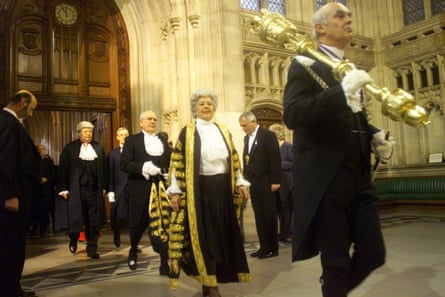
Boothroyd was an early political activist. Her parents, Archibald and Mary, were members of the Labour party and the Textile Workers’ Union on which they relied for the protection of their jobs in the heavy woollen industry in the old West Riding. They did not always have work, although Mary, a weaver, was more often employed than her husband – because her wages, as a woman, were less.
Their lives were hard and Boothroyd never romanticised her past: taking it in turns with her mother to scrub the front steps, the zinc bath on Fridays in front of the fire, sitting talking in the evening by firelight in order to save on the electricity. In later life, Mary would look at all the lights on in her daughter’s home and say: “This place looks like the Blackpool illuminations.” The family occasionally had enough money to go to Blackpool – staying there until it ran out. Her mother knitted Betty’s bathing costume. It was a happy childhood, but the child hated the narrow streets and the dark satanic mills.
She was closer to her father – who taught her secretly how to roll cigarettes and when drinking never to mix grape and grain – but it was her mother who fostered what would become her political career. Mary took Betty to political meetings: packing jam sandwiches and taking her off to Huddersfield or Leeds town hall on a Saturday afternoon to see Clem Attlee – and his wife Vi with her long, painted fingernails – and Nye Bevan and Jennie Lee. Betty joined the Labour League of Youth at 16 and was a member of its national consultative committee when the Attlee government fell in 1951.
The following year, when Denis Healey fought and won a byelection in Leeds South East, he recorded that there were only two memorable events during his campaign. One was the death of the King. The other was when he took the afternoon off to judge a speaking contest for young socialists “and chose as winner a bonny lass from Dewsbury who danced as a Tiller girl in the chorus of the local pantomimes: her name was Betty Boothroyd …” That year Boothroyd also stood, although unsuccessfully, for Dewsbury council.
The Boothroyd family was agreed that education was the political key and while young Betty was not academic she had been good at essays. When she was ill at home for a fortnight, her father used his lunch hour to walk to her school every day to collect her homework. The happiest day of her parents’ lives, she would say, was when at the age of 13 she won a scholarship to Dewsbury Technical College, where she could learn the skills to earn her living.
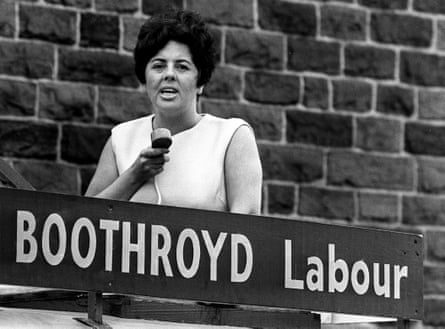
The only problem was that she also liked dancing and nearly broke her father’s heart by trying to turn professional when she was 17.
She had been a singer and dancer “hoofing it” with a teenage jazz band, the Swing Stars, entertaining servicemen under the auspices of Ensa, when she successfully auditioned for the Tiller Girls in London. She spent the freezing winter of 1946, miserably unhappy, incredibly cold, in her lodgings at the Theatre Girls’ Club in Greek Street and then, after a short spell at the London Palladium, was sent to perform in Luton in Goldilocks and the Three Bears.
She limped home with a foot infection and a bruised ego – “I wasn’t much good at it actually” – and it was another 30 years before she would at last appear, like the Tiller Girls, on the stage of the Blackpool Winter Gardens, but now as a member of the Labour party’s national executive committee.
Back in Dewsbury, chastened by the debacle of her show business career, she took a job as secretary to the Road Haulage Association. But she never forgot showbiz.
When she appeared on Desert Island Discs in 1993, one of her choices was Ethel Merman singing There’s No Business Like Show Business and it was a conscious echo of her favourite singer that prompted her to announce “call me madam” when she took the chair of the House of Commons and was asked how she would like to be addressed. She brought a pizzazz to the speaker’s role, declining to wear the traditional full-bottomed wig, thus appearing attractively stylish and modern, in contrast to her predecessors.
On her return to London in 1952, she joined the research department at the Labour party’s headquarters, Transport House, as a secretary. She then worked as a secretary in the Commons for Castle and Geoffrey de Freitas, as secretary to a US Congressman in Washington DC for two years (1960-62) and for one of the first Labour life peers, Lord (Harry) Walston, until she entered parliament.
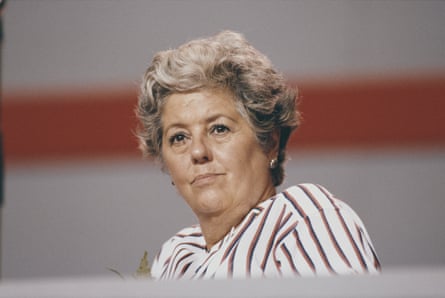
She had contacts across the party – she shared a flat for many years with Jo Richardson, a notable leftwing Labour MP – and was active in London’s Labour politics as a member of Hammersmith borough council from 1965 until 1968. She was herself a rightwing pro-European in party terms, yet despite her friendship with Walston and De Freitas, whose views she shared on almost everything, her politics were defined ultimately by party loyalty.
The formation of the breakaway Social Democratic party in the early 80s partly lay in the “Walston group”, which had met in the former Labour minister’s apartments in the 70s, but Boothroyd fought within the Labour party, taking Shirley Williams’s seat on the party’s national executive in 1981, after the latter’s defection to found the new party. She remained on the NEC until 1987.
After her election as an MP, Boothroyd made a feisty maiden speech, ignoring what had previously been the convention to avoid controversy when first contributing to a parliamentary debate. She claimed to be able to speak for “ordinary working people” and attacked the then Conservative government for its failure to alleviate the injustice of the two-tier society that existed in the UK.
She became the first woman to be made a Labour government whip when appointed assistant whip for the West Midlands after the October 1974 election. The then chief whip, Bob Mellish, reportedly told her: “Keep your trap shut, girl, and you will get on” but instead she resigned the post the following year to serve as an appointed member of the European Assembly, in the era before direct elections took place.
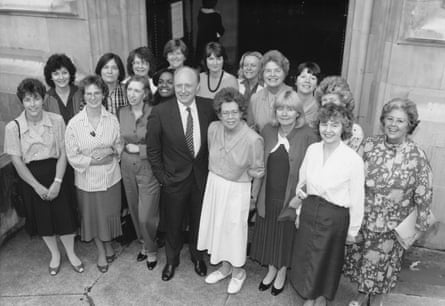
From 1979 she served as a member of the select committee on foreign affairs and, more importantly, joined the speaker’s panel from which committee chairs are chosen. She was also a member of the House of Commons commission that oversees the running of parliament and in 1987 was appointed third deputy speaker. She became the favoured Labour candidate for the speakership, despite the seniority of Harold Walker, who by that time had been the deputy speaker for nine years, because she had some influential supporters on the Tory benches and because she represented a new chapter for parliamentary affairs.
Boothroyd was not an innovative speaker. She opposed the changes in parliamentary hours that were subsequently introduced after her term of office and she suffered some criticism for failing, in the opinion of some radical MPs, to help the Commons update its role – notably by refusing to allow women MPs to breastfeed in the chamber during debates.
She believed that it was up to MPs to make changes in the way business was done, rather than the occupant of the chair, but she did complain vociferously in public and in private at the growing practice of ministers choosing to bypass the House of Commons and make important political pronouncements on the BBC Radio 4 Today programme instead. This became a particular issue after the election of Tony Blair in 1997.
However, she ruled the Commons with good humour and considerable charm. “To err is human, but Erskine May is divine” she once said in response to a recalcitrant MP who was challenging the parliamentary rule book. When members spoke for too long she had a habit of clumsily stifling a yawn as a signal of her displeasure and at the end of prime minister’s questions she inadvertently introduced what would become her catchphrase by declaring after one of her first sessions in the chair: “Time’s up!” She revelled in the comparison it earned her with a barmaid from a television soap.
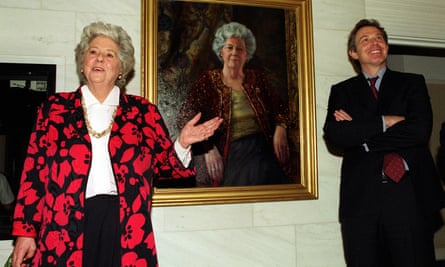
Her most difficult day in the chair was in 1993, when she failed to prevent the Conservative MP Michael Mates from launching an aggressive attack on the Serious Fraud Office in the course of his resignation statement as a Northern Ireland minister. She tried to prevent him breaking an important rule of sub judice and, as she admitted, “fluffed it”. She got a bad press but it did not damage her reputation.
Boothroyd took her seat as a crossbench peer in 2001 when she retired from the speakership. Honours and honorary degrees were heaped upon her, by universities including Oxford, Cambridge, London and St Andrews, but her personal interests centred on her role as chancellor of the Open University. It was a post she was invited to accept because of her support for the universal right to adult education.
She campaigned successfully and with great gusto for a memorial to be erected in Whitehall to commemorate the role of the women of Britain in the second world war. She was judicious about the use of her considerable political authority as a member of the Lords, but campaigned against Brexit. She also deplored the Labour party’s lurch towards the left under the leadership of Jeremy Corbyn and despaired of the subsequent loss of the party’s former “Red Wall” northern seats.
She did not marry, despite receiving a number of offers – at least three of which were serious – saying that they always came at the wrong time. She was sad never to have had children, but she was brilliant with other people’s and had an instinctive touch for treating them as if they were grown-ups. It was possibly the secret of her success as speaker.
Betty Boothroyd, Lady Boothroyd, politician, born 8 October 1929; died 26 February 2023
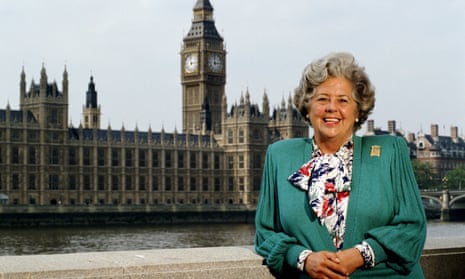
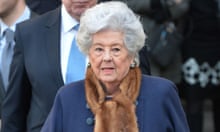
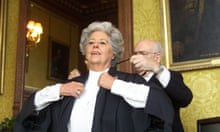
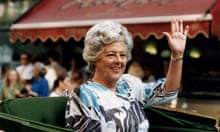
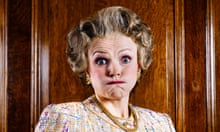
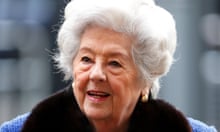

Comments (…)
Sign in or create your Guardian account to join the discussion